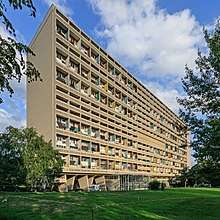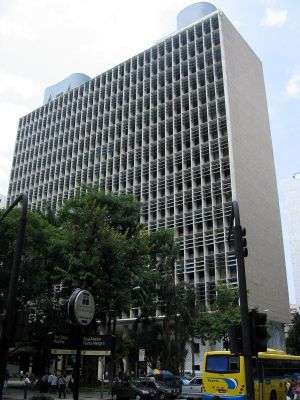Brise soleil
Brise soleil, sometimes brise-soleil (French pronunciation: [bʁiːz sɔlɛj], plural, "brise-soleil" (invariable), or "bris-ole", from French, "sun breaker"), is an architectural feature of a building that reduces heat gain within that building by deflecting sunlight.[1]
Architecture
Brise-soleils can comprise a variety of permanent sun-shading structures, ranging from the simple patterned concrete walls popularized by Le Corbusier in the Palace of Assembly to the elaborate wing-like mechanism devised by Santiago Calatrava for the Milwaukee Art Museum or the mechanical, pattern-creating devices of the Institut du Monde Arabe by Jean Nouvel.
In the typical form, a horizontal projection extends from the sunside facade of a building. This is most commonly used to prevent facades with a large amount of glass from overheating during the summer. Often louvers are incorporated into the shade to prevent the high-angle summer sun falling on the facade, but also to allow the low-angle winter sun to provide some passive solar heating.[2]
Gallery

.jpg)


See also
References
- ↑ Peter Borden, Gail; Meredith, Michael, eds. (2012). Matter: Material Processes in Architectural Production. Routledge. p. 330.
- ↑ Tolson, Simon (2014). Dictionary of Construction Terms. CRC Press. p. 40.
External links
| Wikimedia Commons has media related to Brise soleils. |
- Brise soleil at the Milwaukee Art Museum
- British-Yemini Society Influence of climate on window design
- AD Classics: AD Classics: Palace of the Assembly / Le Corbusier
